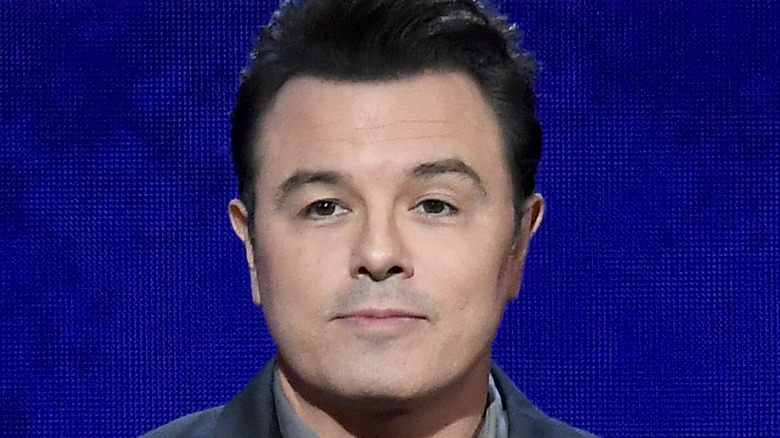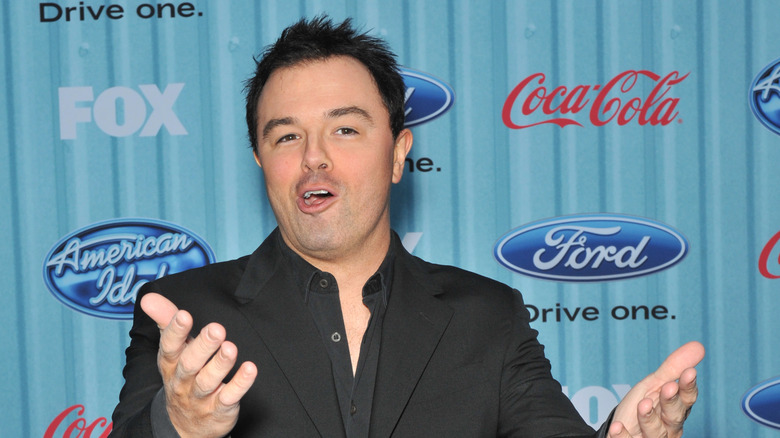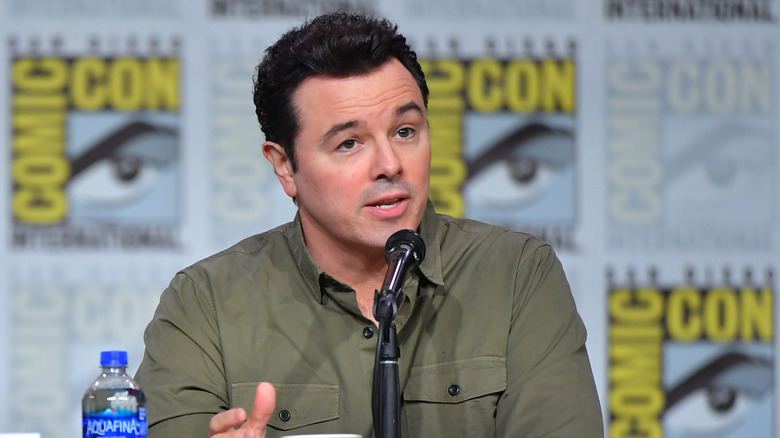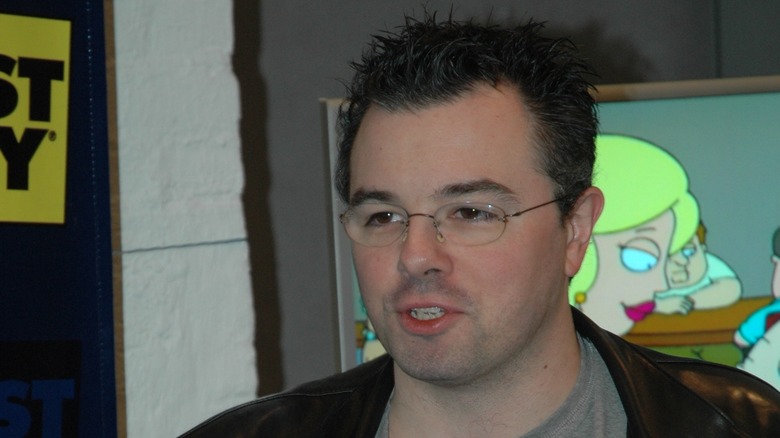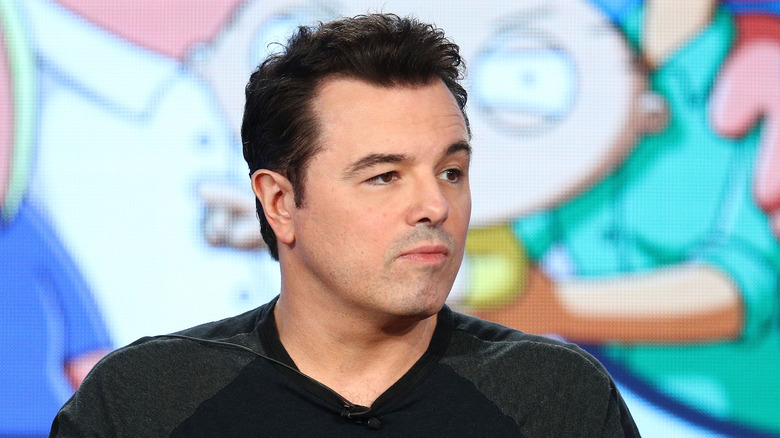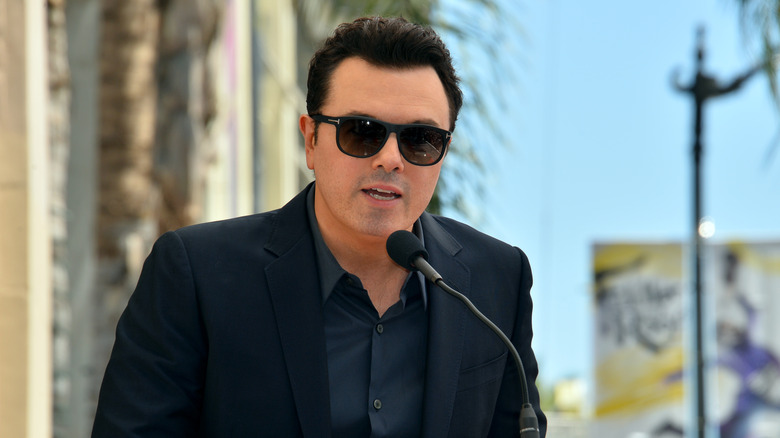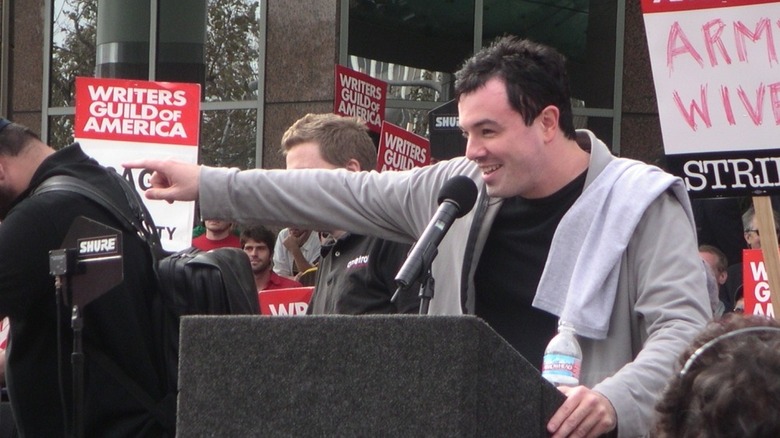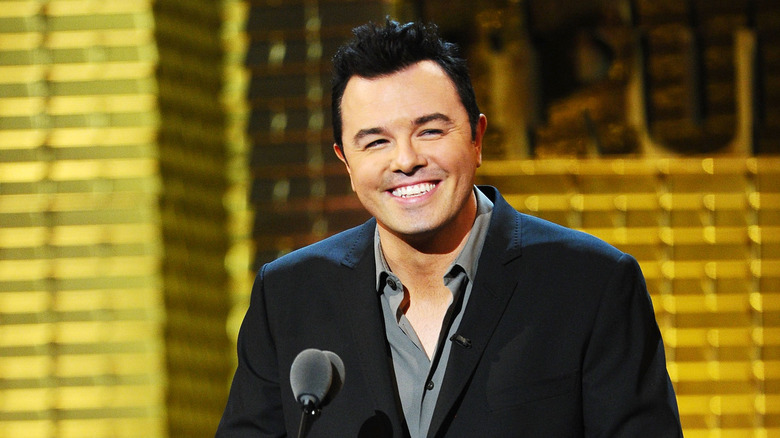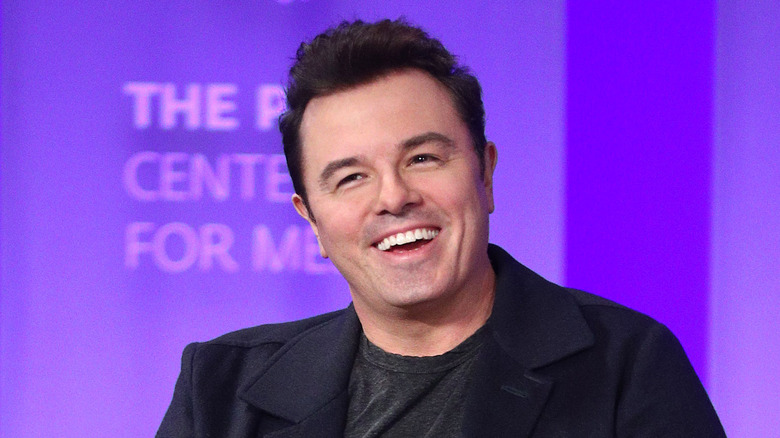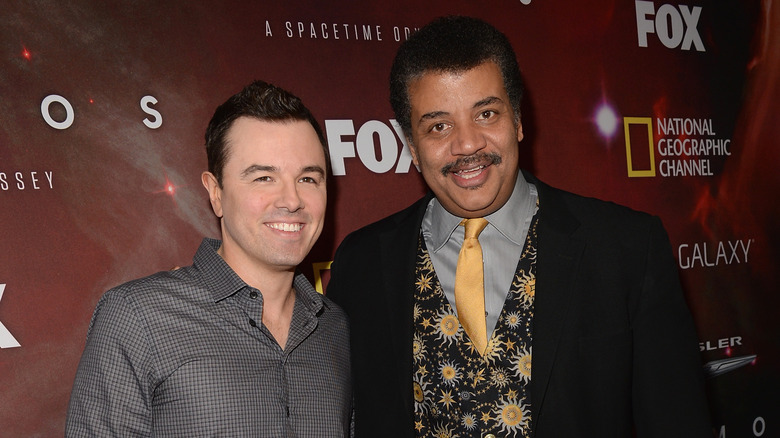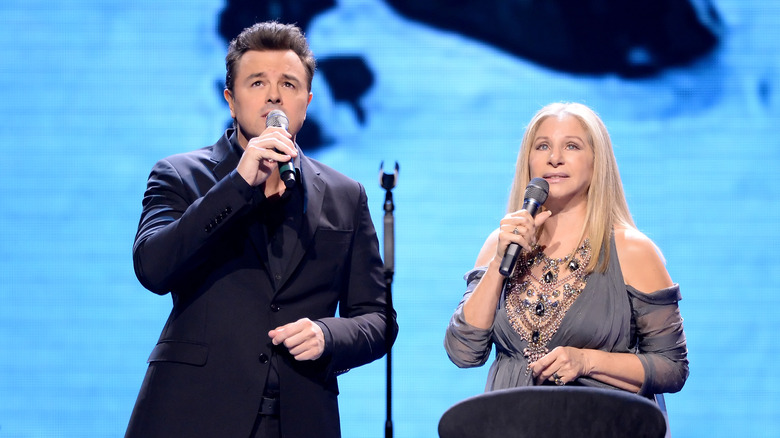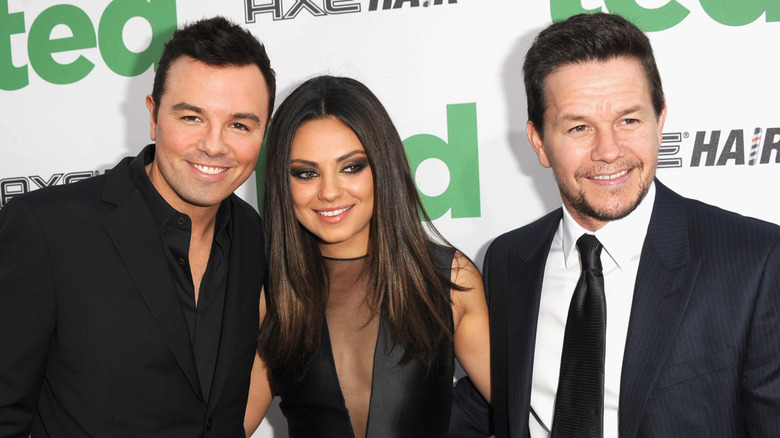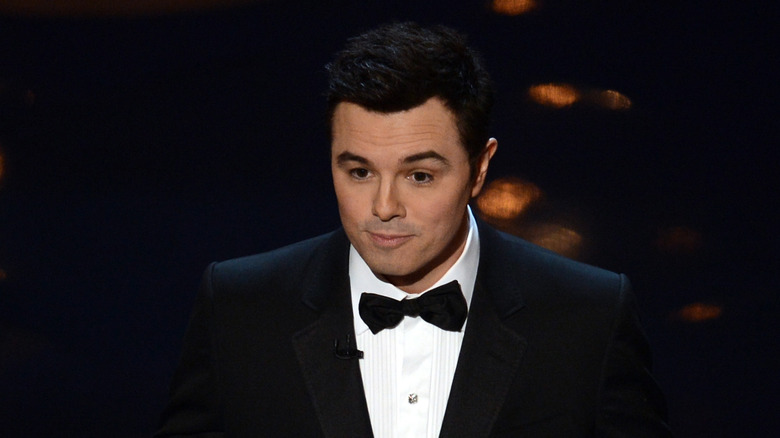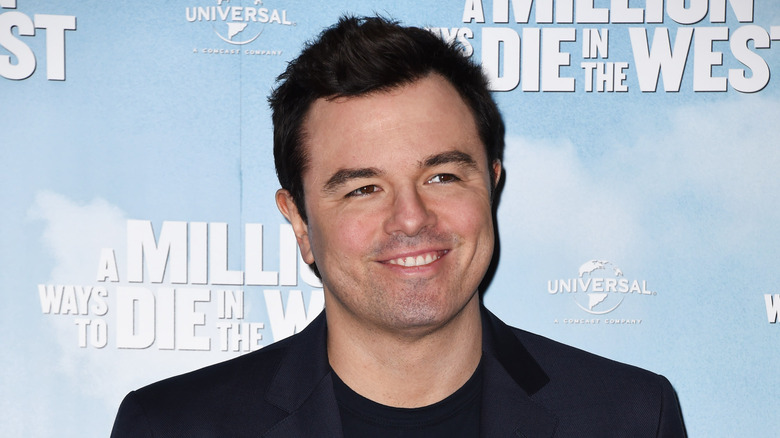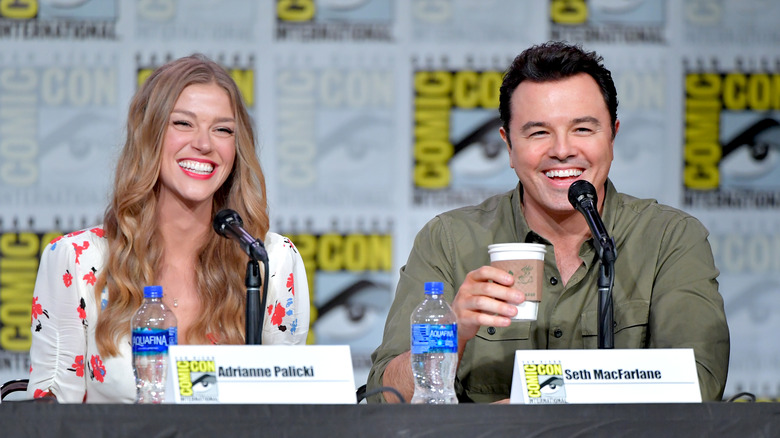The Untold Truth Of Seth MacFarlane
We may receive a commission on purchases made from links.
Seth MacFarlane can do it all. The actor and comedian got his start as an animator for Hanna-Barbera before moving on to creating and producing his own shows. He's the man behind such hits as the animated sitcoms "Family Guy," "American Dad!," and the Fox-turned-Hulu sci-fi series "The Orville." He's also had success on the big screen with "Ted," which he wrote, directed, and stars in.
You don't get to where Seth MacFarlane is without luck, perseverance, and most importantly, a keen ability to upset people. His work has frequently garnered criticism and backlash from the targets of his jokes. Whether it's through "Family Guy" cutaways, obscure references in his movies, or even his activism, Seth has managed to be the subject of controversy throughout most of the 21st century. That being said, there's a lot that even diehard fans may not know about the multi-hyphenate, from his earliest animation work to some behind-the-scenes secrets of his biggest projects.
Seth MacFarlane's roots go back to colonial America
Two of Seth MacFarlane's most popular voices are Peter Griffin from "Family Guy" and Ted the teddy bear. The two have thick Bostonian accents, an impression that MacFarlane developed throughout his entire life. He was born in Connecticut, and has deep ties throughout the New England area. In fact, his family tree goes all the way back to the Plymouth Colony, which was founded by English pilgrims who traveled to America on a ship known as the Mayflower.
One of Seth's ancestors was a passenger on the Mayflower named William Brewster. Upon settling, Brewster became a senior elder of Plymouth Colony before dying in 1644. He left behind a noble legacy — his descendants allegedly total in the tens of thousands, and include many notable figures throughout history and entertainment such as MacFarlane, Ted Danson, Julia Child, Richard Gere, and Katharine Hepburn.
Some of Brewster's descendants also include various historical figures, from 12th President Zachary Taylor to politician/right-wing pundit Sarah Palin and novelist Thomas Pynchon.
Family Guy began as a series of short films
Seth MacFarlane's love for illustration began early in his childhood. At nine years old, he got his first job selling comic strips to his local school paper. This would also be his first brush with controversy, as a comic he did mocking the Catholic Communion ritual was not well-received by locals. He later pursued this passion as a career by attending the Rhode Island School of Design, a very influential period in Seth's journey to making his hit series "Family Guy."
Not only did Seth meet Mike Henry, who would go on to voice Cleveland in "Family Guy," but he also began working on the series of short films that would eventually inspire the animated sitcom. For his thesis, Seth created "The Life of Larry," featuring himself voicing a man and his talking pet dog. Larry and Steve later evolved into Peter and Brian in "Family Guy," but first, "The Life of Larry" got MacFarlane an opportunity to work for Hanna-Barbera, the studio that gave us shows like "The Flintstones" and "Scooby-Doo, Where Are You." Seth was hired to work for animated shows of the 1990s such as "Johnny Bravo" and "Dexter's Laboratory," and his time on these shows helped inform his future work as a showrunner.
Pursuing other projects
While still working at Hanna-Barbera, MacFarlane spent six months working on a pilot for his own animated series to pitch to Fox. Ideally, having an animated show on prime time would allow Seth the opportunity to explore an edgier, darker sense of humor than he was able to on a show like "Johnny Bravo." Fox responded well to the pilot, which was intended to air alongside "MADtv" before plans fell through and it premiered as its own series in 1999, titled "Family Guy."
"Family Guy" was canceled and brought back several times, but the show's initial ratings struggles didn't stop the network from working with MacFarlane on other projects. In 2003, Fox ordered a new show from MacFarlane and co-creators Matt Weitzman and Mike Barker titled "American Dad!," centering on a family whose patriarch works for the CIA. Around this time, MacFarlane also developed "The Cleveland Show," which he co-created with Mike Henry, a spinoff of "Family Guy" starring Peter's neighbor, Cleveland Brown.
These three shows were MacFarlane's main focus for a while, though his outrageous and profane humor was still limited by the rules and regulations of network TV. Eventually, he went seriously over the top with "Seth MacFarlane's Cavalcade of Cartoon Comedy," a series of web shorts that includes parodies of "Super Mario Bros.," "The Flintstones," and Wile E. Coyote cartoons.
MacFarlane's many similarities with Brian Griffin
It's no secret that Seth MacFarlane provides most of the voices on his own shows. For a series like "Family Guy," some scenes will often feature MacFarlane talking to himself via his own characters. He even parodied the concept that his voices are split personalities during his monologue when he hosted "Saturday Night Live" in 2012. For one of those characters, the idea may not be far from the truth. Many fans have theorized about the similarities between MacFarlane and Brian, the Griffin family dog from "Family Guy."
Not only is Brian's voice also MacFarlane's natural accent, but the two are both writers, they share political views, and they both have an affinity for the same alcoholic drinks. In an interview with the Daily Princetonian, MacFarlane acknowledged the comparisons, particularly with regards to his dating life. Brian's frequent romantic troubles are often the source of "Family Guy" stories, though MacFarlane keeps his personal life relatively private (he briefly dated "Game of Thrones" star Emilia Clarke).
However, other moments have proven that MacFarlane chooses to keep his characters at a distance personally. In season 12 of "Family Guy," the show made headlines when Brian was killed off. Although the character came back a few episodes later, MacFarlane spoke to Rolling Stone about the arc as a way for the creators to surprise audiences after many years of being on the air.
MacFarlane's close call with the September 11 attacks
While Seth MacFarlane is widely known for his topical, often edgy humor, many don't know how close he is to some of the controversial subjects he jokes about. For example, although he's far from the only comedian to make jokes about the terrorist attacks on the World Trade Center on September 11, 2001, he's one of the few with a close personal connection to the events.
On the morning of 9/11, Seth was meant to board American Airlines Flight 11, though he was late and missed the flight. According to a web interview from 2003, Seth's travel agent had given him the wrong departure time. As we now know, Flight 11 was hijacked and flown into the North Tower of the World Trade Center — and MacFarlane's public reaction has been somewhat surprising.
He's explained in interviews that, despite the enormity of 9/11 as a tragedy, he relates the experience to "crossing the street and you almost get hit by a car." In 2011, he faced controversy for a joke about 9/11 in "Family Guy" wherein Brian travels back in time to stop the attacks, resulting in a worse version of America in the present. He defended the story numerous times in response to the backlash.
Stirring up trouble during the writers' strike
On November 5, 2007, the Writers Guild of America went on a strike that lasted until February the following year. During the three-month period, several television shows went on hiatus, including "Family Guy." Seth MacFarlane was a participant in the strike, siding with the Writers Guild against the networks, but Fox continued to air "Family Guy" episodes without MacFarlane's consent.
Postponing production during the strike wasn't a given for all shows on every network. On Comedy Central, "The Daily Show with Jon Stewart" and "The Colbert Report" both returned to air in January of 2008 without writers. Out of respect to their writing staff, the names of each show were changed for the time. In retaliation, MacFarlane cracked a joke about Stewart in a later episode of "Family Guy."
Stewart didn't take kindly to this; in fact, he called MacFarlane and berated him over the phone. In an interview with Piers Morgan, MacFarlane defended Stewart's reaction while maintaining his position of calling him out for continuing production during the strike. Given the fact that MacFarlane subsequently appeared as a guest on "The Daily Show," it's safe to say that the two were able to put this brief feud behind them.
Becoming the emcee for Comedy Central roasts
Seth MacFarlane's animated shows haven't been his only opportunities to make fun of celebrities. In 2010, MacFarlane made his debut as Roastmaster on Comedy Central's roast of David Hasselhoff. He was joined by Hasselhoff's "Baywatch" co-star Pamela Anderson, as well as comedians Whitney Cummings, Gilbert Gottfried, and Greg Giraldo. MacFarlane went on to reprise his roastmaster role in two subsequent Comedy Central roasts.
In his second go as roastmaster, MacFarlane served as emcee for the roast of Donald Trump, four years before the real estate mogul successfully ran for President of the United States. In an interview with Seth Meyers discussing the roast in hindsight, MacFarlane commented that Trump was "boring" and seemed neutral toward every joke made about him. According to MacFarlane, the only topic that was off limits to the roasters was Trump's numerous bankruptcies.
MacFarlane's third and final outing came during the roast of Charlie Sheen in 2011, which took place at the high point of Sheen's infamous public meltdown. The episode aired only an hour following Ashton Kutcher's debut episode of "Two and a Half Men," replacing Sheen. Although it's been over ten years since MacFarlane participated in a Comedy Central roast, he was the perfect choice to host several evenings of celebrity takedowns.
Seth MacFarlane's activism
Throughout his career, Seth MacFarlane has been outspoken in his support of the Democratic Party. In 2008, he stood behind presidential candidate Barack Obama, and has donated millions of dollars to Democrats. He also supported future Democratic candidates Hillary Clinton and Joe Biden during the general elections, though his original choices were Bernie Sanders in 2016 and Pete Buttigieg in 2020. Aside from political support, MacFarlane has also advocated for many liberal causes such as LGBTQ+ rights and same-sex marriage. In 2011, he was awarded Harvard Humanist of the Year for his support of equal rights; in June 2022, MacFarlane spoke out against the Supreme Court's decision to overturn Roe vs. Wade, calling it "dystopian sci-fi." His lauded advocacy aside, he's also received criticism for jokes on several of his animated shows.
One episode of "Family Guy" sees Glenn Quagmire's father go through a sex change, resulting in a transphobic reaction from several characters. Once Brian Griffin learns that the woman he's slept with is Quagmire's father, he proceeds to vomit, which drew a negative reaction from organizations like GLAAD. MacFarlane defended the storyline, claiming it was a sympathetic portrayal of transgender people, but projects like "Ted 2" prove that, despite his support for the LGBTQ+ community, he hasn't lost his ability to offend.
Seth MacFarlane produced a reboot of Cosmos
In August 2011, Seth MacFarlane set out for the final frontier — to boldly go where no man had gone before by executive producing a revival of Carl Sagan's PBS documentary miniseries "Cosmos: A Personal Voyage." In an interview, MacFarlane claimed that watching the original "Cosmos" shaped his childhood, and meeting celebrity astrophysicist Neil DeGrasse Tyson at a Los Angeles office for the National Academy of Science was the first step in getting the show produced.
This new version, titled "Cosmos: A Spacetime Odyssey," featured Tyson in Sagan's role from the original series. Whereas "A Personal Voyage" covered topics like the creation of life, constellations, and the Big Bang, Tyson educated viewers on black holes, Newton's theory of light, and climate change. A sequel series was released in 2020, featuring Tyson returning as host and MacFarlane back in the executive producer chair. This season covered topics like the Apollo mission to the moon and Sagan himself. Throughout the series, MacFarlane also voiced characters in animated sequences.
This tribute to the late, great astronomer isn't MacFarlane's only contribution to Sagan's legacy. In 2012, shortly after the "Cosmos" revival, he donated Sagan's personal papers to the Library of Congress — a collection dubbed the Seth MacFarlane Collection of the Carl Sagan and Ann Druyan Archive, consisting of Sagan's research, unpublished books, and personal documents like photographs and childhood journals.
Seth MacFarlane's passion for big band music
Seth MacFarlane loves a good show tune. Musical numbers are a huge part of his animated series, including "Family Guy" and "American Dad!" In 2011, MacFarlane signed a record deal with Universal Republic Records, the label that's home to artists like Taylor Swift, Post Malone, and Ariana Grande (who starred in an episode of "Carpool Karaoke" with MacFarlane).
Within a year of his signing, he released "Music Is Better Than Words," an album of traditional pop covers. Recording using the same microphone that Frank Sinatra sang with, MacFarlane produced the album with Joel McNeely, a composer on "American Dad!" The record was nominated at the 2012 Grammy Awards for Best Traditional Pop Vocal Album, losing to Tony Bennett's "Duets II."
MacFarlane's music career has continued with further releases, including "Holiday for Swing," a Christmas album featuring duets with Norah Jones and Sara Bareilles. He also sang with Barbra Streisand on her celebrity duet album "Encore: Movie Partners Sing Broadway," contributing to a cover of "Pure Imagination" from "Willy Wonka & the Chocolate Factory." One of his more recent releases, "Once in a While," came out in 2019 and was recorded at the legendary Abbey Road Studios.
Making made his directorial debut with Ted
In 2011, Seth MacFarlane announced on an episode of "Conan" that he was going to direct his first feature film, which arrived the following year in the form of "Ted." MacFarlane not only co-wrote the film, but also voiced and did motion capture for the title character, a foulmouthed teddy bear who comes to life. Opposite MacFarlane, Mark Wahlberg starred (who, like MacFarlane, was also meant to be on American Airlines Flight 11) as well as Mila Kunis, who voices Meg Griffin on "Family Guy."
The movie turned out to be a smash hit. "Ted" became the ninth-highest-grossing film of 2012, and one of the highest-grossing R-rated films of all time. It also earned an Oscar nomination for Best Original Song for Norah Jones' "Everybody Needs a Best Friend." The film's success was likely aided by Universal Pictures' marketing campaign, which included real-life Ted dolls as well as a NSFW commercial for Axe starring MacFarlane as Ted.
"Ted 2" was released in 2015. Wahlberg returned, though Kunis did not; the sequel instead made room for supporting roles from Amanda Seyfried and John Slattery. Although the sequel was less successful than its predecessor, a prequel series starring Ted was announced in 2022.
Seth MacFarlane's controversial Oscars hosting gig
Hot off the success of "Ted," Seth MacFarlane was hired as the host of the 85th Academy Awards in 2013. His opening monologue included a cameo appearance by William Shatner as Captain James T. Kirk from "Star Trek," during which Kirk warns MacFarlane that the evening will be a disaster.
Part of this disaster included a musical number Seth performed, titled "We Saw Your Boobs." The song lists the names of several actors who've appeared nude, including Kate Winslet, Kristen Stewart, and Halle Berry. While several stars were in on the joke enough to film reaction shots (Naomi Watts and Jennifer Lawrence, among others), others took offense. Jane Fonda, for example, was unhappy about the song's focus on women getting naked in film, rather than pointing out men who've bared it all onscreen.
Several other publications deemed the song, and MacFarlane's overall performance as host that evening, as "disturbing," "hostile," and "misogynistic." The Academy defended him on the basis of creative freedom, but the moment still inspired editorials criticizing MacFarlane's mockery of women throughout his career.
Liam Neeson's revenge
Seth MacFarlane's second time in the director's chair for a feature film had a lot riding on it following the success of "Ted." This time around, MacFarlane abandoned the motion capture suit and donned a cowboy hat for "A Million Ways to Die in the West." MacFarlane starred as Albert Stark, a cowardly sheepherder who's challenged to a duel by an outlaw, leading an all-star cast that included Charlize Theron, Sarah Silverman, and Giovanni Ribisi — not to mention a former target of jokes in "Family Guy."
The character of Clinch, husband to Charlize Theron's Anna, was played by Liam Neeson. When the "Taken" star was asked to be in the film, the actor recalled a "Family Guy" cutaway that mocked the idea of Neeson using his native accent in an American western and requested that his character keep his Irish accent. MacFarlane agreed.
Not all of Seth MacFarlane's Hollywood interactions have been as cordial in response to "Family Guy" mockery. In an episode of "Watch What Happens Live," MacFarlane recalled meeting Adrien Brody and attempting to compliment him on his film "Splice," but instead faced backlash for a joke regarding Brody starring in a 3D movie.
The Orville is MacFarlane's dream project
In recent years, MacFarlane has taken a step away from TV animation. While he still provides voices for "Family Guy" and "American Dad!," his main focus is "The Orville," a sci-fi comedy series he created, writes, and stars in. The show is stylistically an homage to the original "Star Trek," featuring MacFarlane as the captain of the titular spaceship, where his ex-wife (played by "Friday Night Lights" star Adrianne Palicki) serves as first officer.
For MacFarlane, "The Orville" is the show he's wanted to make ever since he was a kid. In a media landscape of very dark sci-fi shows, MacFarlane wanted "The Orville" to incorporate the optimism that "Star Trek" embodied when it premiered.
The show received subpar reviews for its first season, with some criticizing its nature as a throwback series, and others blatantly labeling it a ripoff of "Star Trek." Its subsequent seasons, however, have been much more well-received, both garnering impressive scores on Rotten Tomatoes.
